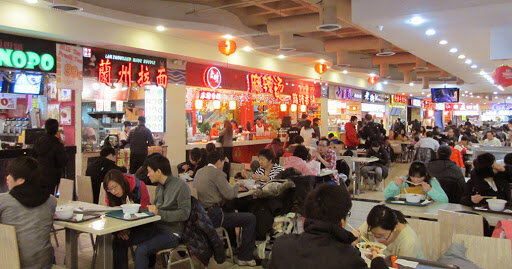A Love Song to Flushing: Marcus Yi’s Flushing Food Court Musical

A Love Song for Flushing: Marcus Yi’s Flushing Food Court Musical
By Sharon M. Chin
Love is sometimes shaped like a dumpling.
In many Asian households, familial love does not match typical Western endearments. Asian parents are more apt to ask, “Have you eaten?” in lieu of a heartfelt hug. So when Marcus Yi, a musical theater director and writer, saw an opportunity create a commissioned art piece centered on Flushing, his love letter to Flushing transmuted. Marcus penned his artistic love letter as a musical centered on Flushing’s immigrant families and relationships with food. Marcus, a recipient of the Queens Council of the Arts Artist Commissioning Program, has created Lucky 88, the first musical set in a Flushing food court.
Flushing’s New World Mall Food Court and Works in progress documents for Lucky 88
Flushing, New York holds an incredible spot as a food mecca in the minds of most New Yorkers. Chances are your mouth may have already started to water at the mention of a neighborhood ubiquitous with bountiful Asian cuisine. Marcus wanted to extend Flushing’s story beyond its food-centricity and instead spotlight the lives and struggles of its residents. Marcus notes “Flushing is special. I worked as an immigration lawyer on Prince Street- close to the heart of Flushing- and I heard so many deeply personal and heart-aching stories from its residents.” From marriage and immigration to victims of 9/11, Marcus saw “a community rich with stories- often bound by the common challenge of navigating a new world.” Marcus saw many immigrants, facing economic and language barriers, struggling to build a life- “from bills to ballots”- and Marcus saw an opportunity to give voice to their stories.
Digitized characters of Lucky 88. Human actors will bring these characters to life
Lucky 88, the musical, emerges as a warm, authentic, and fresh musical focused on 3 family-run Flushing food court stalls. At the hand pulled noodle stall, 60-year-old Shen Zha struggles to put his son through law school. Unbeknownst to him, his son has dropped out, preferring to take over the family business. At the dumpling stall, 50-year-old widow Mei Ling is ready to start dating again. And at the boba tea stall, 20-year-old Fan Fan desires to be a hip hop dancer but has to work to pay for her mother’s chemotherapy.
Through these individual and intertwining plots, Marcus explores themes of intergenerational conflict, diverging definitions of the American dream, love and dating at any age, and coping with serious illness. And, as this a musical, the characters express their heightened emotions in song. Son Brendan sings of “feeling underwater” as he contemplates revealing his dreams to his father. For Mei Ling, her feelings emerge in a song surreally sung by two living dumplings, advising her that “Dumplings are like people/We’re not solitary/ One just does not satisfy.” There is exceptional tenderness when one character sings of parental admiration, comparing the feeling to the warmth of “eating hot noodles when it snows.” These are authentic emotions felt by Chinese-American immigrants fleshed out in song.
Marcus has fond memories dining in Flushing food courts, particularly the grand New World Mall food court. As a Singaporean immigrant, he recalls the food court offering comfort, myriad choices, and the familiarity of home. He also acknowledges that the food court was a feast for both taste buds and observations. He recalls “colorful signage and interesting characters, smelling and tasting aromatic dishes, and hearing an amalgamation of conversation and diverse music.” He wondered at the interior lives of his fellow diners and the food court workers. The food court would become the gestalt for Lucky 88. Flushing food court vibrancy also informs its musical soundtrack. Marcus, alongside music director Sobina Chi, incorporates the diverse sounds of Flushing- from mandopop, traditional Chinese folk, Argentine tango, and Chinese rap- sounds all potentially rippling through a food court-into this show.
Excerpt from Lucky 88
While many of Lucky 88’s songs and narrative lenses are peppy and comedic, the citizens of the Lucky 88 food court face a larger conflict amid their familial ones-the specter of gentrification. Queens Historical Society Executive Director and QCA Arts Commissioner Branka Duknic notes that Flushing is undergoing an evolution in its land use- citing “increasing commercial development resulting in upscale restaurants, luxury apartments, and medical offices” which are displacing the current small family owned businesses. This macro-level conflict, very much realized throughout Flushing today, undergirds each individual’s uncertainty and unites all the families under one common concern.
Excerpt from the Asian American Performers Action Coalition Visibility Report
As a playwright, Marcus is a furious writer. Musicals often take years to be realized on a stage but Marcus created the plot, libretto, and entire Lucky 88 musical within a span of 9 months. Marcus stands out for his speed in going from a creative prompt to a fully staged (digital) presentation. Marcus’s work, as both a BIPOC writer and director, however, also stands out for its stark contrast to the racial inclusiveness of NYC’s current theater scene.
According to the Visibility Report from the Asian American Performers Action Coalition, released September 30, 2020, 100% of Broadway musicals were directed by white directors. White directors were also given control of 100% of the Broadway shows written by BIPOC writers and/or about the BIPOC experience. Among NYC theater produced shows, 79.1% of the writers were white. While statistics at off-broadway theaters remain better, overall there’s no question that white voices and white stories dominate New York’s theater industry. Actor Ariel Estrada, who plays Shen Zha, notes “I’m grateful to Marcus for writing an unapologetically Chinese story into being. I can count the number of musicals about Asian-Americans from Asian creators on one hand- and this story, just like the musical art form, is a uniquely American story and deserves to be heard.”
Before Covid-19 disrupted our lives, Marcus envisioned a truly immersive theater experience for Lucky 88. Audiences members would watch the action from within a food court setting, with an opportunity to buy drinks and snacks. Marcus notes “I envisioned audience members sampling dumplings, bubble tea, or other Asian snacks pre-show and during the intermission. They would become real players in the setting for Lucky 88’s story.” He hoped to show the work at Flushing Town Hall with an especial outreach to Flushing citizens. Marcus will premiere his work in partnership with Flushing Town Hall this Sunday, October 4th, but intrigued audiences will have to enjoy this iteration digitally. Marcus, however, promises more than just talking Zoom heads. With resonating immigrant stories amplified by comedy and song, this writer is keen to see Marcus’s bold choices and uniquely centered Flushing stories. And with its delicious plot, creative sound tracks and fully realized Asian and Asian-American characters, we can only hope for future meals alongside the Lucky 88 family.
More from Marcus
Where Can We See You Next: “You can follow me at www.marcusyi.com. For upcoming opportunities. Beyond the QCA Lucky 88 reading on October 4th, CFC Arts in Florida will be doing a zoom production of my musical "The Frog Prince' next week. Pace University will be featuring some of my music in a cabaret to be performed virtually in the Spring of 2021.”
Who Are You Watching: “I don't usually consume art when creating a project but I am watching this anime on Crunchyroll called "Fairy Tale" which is about magicians in the fictional land of Fiore. Also I keep my eye on new works from Yangtze Repertory and the Astoria Performing Arts Center.”
How Has NYC Impacted Your Work: “Too many ways to list. I came here for law school thinking I would give up doing theatre but ended up learning how to play piano as a respite. That helped me achieve my life long dream of writing musicals. Being here I have made so many friends in the musical theatre scene that have supported my work and inspire me to do better with each show.”
What Is Your Favorite Food: “Japanese Spaghetti Bolognese. Not the Italian one.”
One Fun Fact: “ I am also an immigration lawyer? I guess that's not super fun. I am actually quite friendly despite my b*tchy resting face.”












